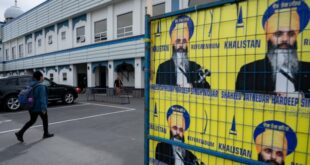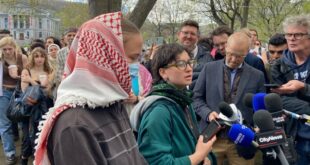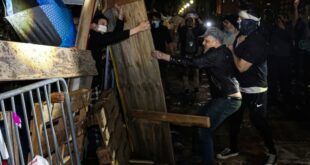B.C. Housing has sued 13 people, accusing them of lying to obtain below-market-price condos in Victoria

Built with a $53-million low-interest loan from the province to underwrite the below-market sale of family homes, Victoria's Vivid condominium development was supposed to be a new model for affordable housing in B.C.
Then housing minister — and now premier — David Eby hailed the 2021 completion of construction on the 135-unit building in the provincial capital's downtown as "great news" for middle-income British Columbians hoping to achieve the dream of home ownership.
But court documents obtained by CBC allege that as many as a dozen of those condos were sold to people who already owned property — in some cases multiple homes worth millions.
B.C. Housing claims 13 purchasers never lived in homes they agreed would be their principal residences — in violation of agreements signed for the right to buy at discount prices.
In hundreds of pages of B.C. Supreme Court civil claims, the Crown agency has accused an array of buyers — including a realtor who allegedly made $53,000 in Vivid commissions — of "egregious and reprehensible" conduct.
"The defendant has intentionally undermined the purposes of the Affordable Home Ownership Program for personal benefit," says the boilerplate language in each of the lawsuits.
"The conduct of the defendant has negative repercussions for all of the people of British Columbia."
A 'pilot project' for affordable home ownership
The Affordable Home Ownership Program is administered by B.C. Housing as part of a multi-pronged effort to combat the affordable housing crisis.
"The intention … is that units made available through the program be owned and occupied by people who otherwise might be unable to participate in home ownership," the lawsuits read.

In 2021, B.C. Housing called Vivid a "pilot project" for partnerships between the private and public sector to boost "the supply of affordable home ownership options for middle-income families and individuals in Victoria."
The province said it gave a $52.9-million low-interest loan to Chard Developments to build the project. The developer was then expected to "pass the savings on to qualifying buyers so units could be purchased at below-market prices."
As a result, the government claimed homes at Vivid sold for an average of 12 per cent below market rates at the time of purchase.
The civil claims say Vivid buyers all attended an "affordable housing program education session" where they were told the project was financed by B.C. Housing and they "were being provided with a discount on the value of their unit."
'She could not tell anyone that she was renting'
To qualify to buy at Vivid, the province said buyers had to be Canadian citizens or permanent residents who could not own property "anywhere else in the world."
According to the court documents, purchasers also couldn't have a combined household income exceeding $150,000.

Buyers agreed to make the units their primary residence and to "physically reside" there for at least two years.
To ensure compliance, a covenant was registered against each property setting out that the unit "shall only be used and occupied for the provision of affordable housing by qualified persons."
But according to the lawsuits — the purchasers of at least 13 units never moved in.
The court documents claim two of the purchasers never set up the intercom systems for their units and another never booked the elevator for a move.
In June 2022, B.C. Housing claims a student from China contacted the Vivid strata council claiming she was paying $1,800 a month to rent the unit for which a Victoria couple paid $317,400.
She allegedly said she was being evicted.
"She had been instructed that rentals were not permitted and that she could not tell anyone that she was renting," the lawsuit reads.
According to the civil claim, the unit's owners also own six other homes in the Victoria area worth a combined total of $7.75 million.
Real estate agent 'realized significant personal profit'
The documents claim another couple own a million-dollar home in Nanaimo and four condos in Burnaby and Victoria worth more than $2.2 million.
One of the other people named is a retiree who allegedly owns a general contracting company with his wife.
The documents claim the couple own two Victoria condominiums and that their company owns or operates nine other properties in the Saanich area.

The buyers named in the lawsuits come from all walks of life — scientist, student, insurance broker, businessman. A number are retired — including a man who allegedly owns a $1.7 million home in Nanaimo where he "currently operates what appears to be a small hotel."
Yet another of the retired buyers was allegedly living in subsidized housing in Chinatown instead of her $309,120 unit at Vivid when B.C. Housing filed suit against her in December 2022.
The bulk of the lawsuits were filed in 2022, but B.C. Housing filed the latest notice of civil claim this week against a software engineer who allegedly paid $300,400 for a unit at Vivid; the suit says he also owns a $716,000 detached home and $425,300 townhome in Victoria.
The agency is also suing real estate agent Janet Yu, who B.C. Housing claims "realized significant personal profit by acting as the realtor for a number of purchasers in the Vivid building." She also bought a unit for herself.
"Nearly all the purchasers for whom [Yu] represented as a realtor have also failed to comply with the terms of the Affordable Home Ownership Covenant," the claim against her reads.
B.C. Housing claims Yu made commissions worth nearly $53,000 from the saleof 12 units. The court documents say Yu lives at a different address with her partner and owns or co-owns properties worth nearly $3 million.
The government 'gained political capital'
The lawsuits are seeking an order to have the title for the units transferred back to B.C. Housing — giving the buyers back what they paid "minus fees and disbursements."
The Crown agency also wants all the money the buyers collected from rentals and is seeking punitive damages — a sanction reserved for particularly egregious cases.

"Given the overarching importance of making affordable housing available within the province, punitive damages are required to achieve the court's goals of retribution, deterrence and denunciation," the lawsuits read.
Yu is one of only two people named in the suits to respond to the claims.
One lawsuit was discontinued; the buyer — who allegedly also owned a $1.3 million condo in Whistler — told CBC he intended to move to Victoria but his circumstances changed because of COVID. He said he couldn't move into the unit so he "ended up giving it back."
Yu denies the allegations.
In her response, Yu claims she "does not speak English as her first or principal language, and has limitations with respect to her understanding of English."
She says she relied upon advice from "the presenters of the affordable housing program education session" and a solicitor "before whom she attended to execute the subject statutory declaration."
Yu also claims she "remained resident at the lot" with the exception of "short and occasional visits to family."
She claims no one ever provided her with evidence of the unit she purchased "having a greater market value than the price she agreed to pay for it."
Another buyer who also allegedly owns a $1 million home in Victoria said in her response that if any subsidy was given "it was to the developer of the strata lots."
"She paid fair market value for the strata lot," the woman's response says.
"The Government of British Columbia gained political capital from publicizing its involvement in the project."
Yu did not return a call from CBC.
In an emailed statement, Chard Developments president Byron Chard said, "This issue is currently before the courts, and therefore, we will not be commenting at this time."
B.C. Housing had not provided a comment by the end of day Monday.
In a statement, a spokesperson said it was "important to note that Vivid at the Yates was a pilot project, it wasn't officially part of the Affordable Homeownership Program as it is currently structured."
*****
Credit belongs to : www.cbc.ca
 MaharlikaNews | Canada Leading Online Filipino Newspaper Portal The No. 1 most engaged information website for Filipino – Canadian in Canada. MaharlikaNews.com received almost a quarter a million visitors in 2020.
MaharlikaNews | Canada Leading Online Filipino Newspaper Portal The No. 1 most engaged information website for Filipino – Canadian in Canada. MaharlikaNews.com received almost a quarter a million visitors in 2020.







